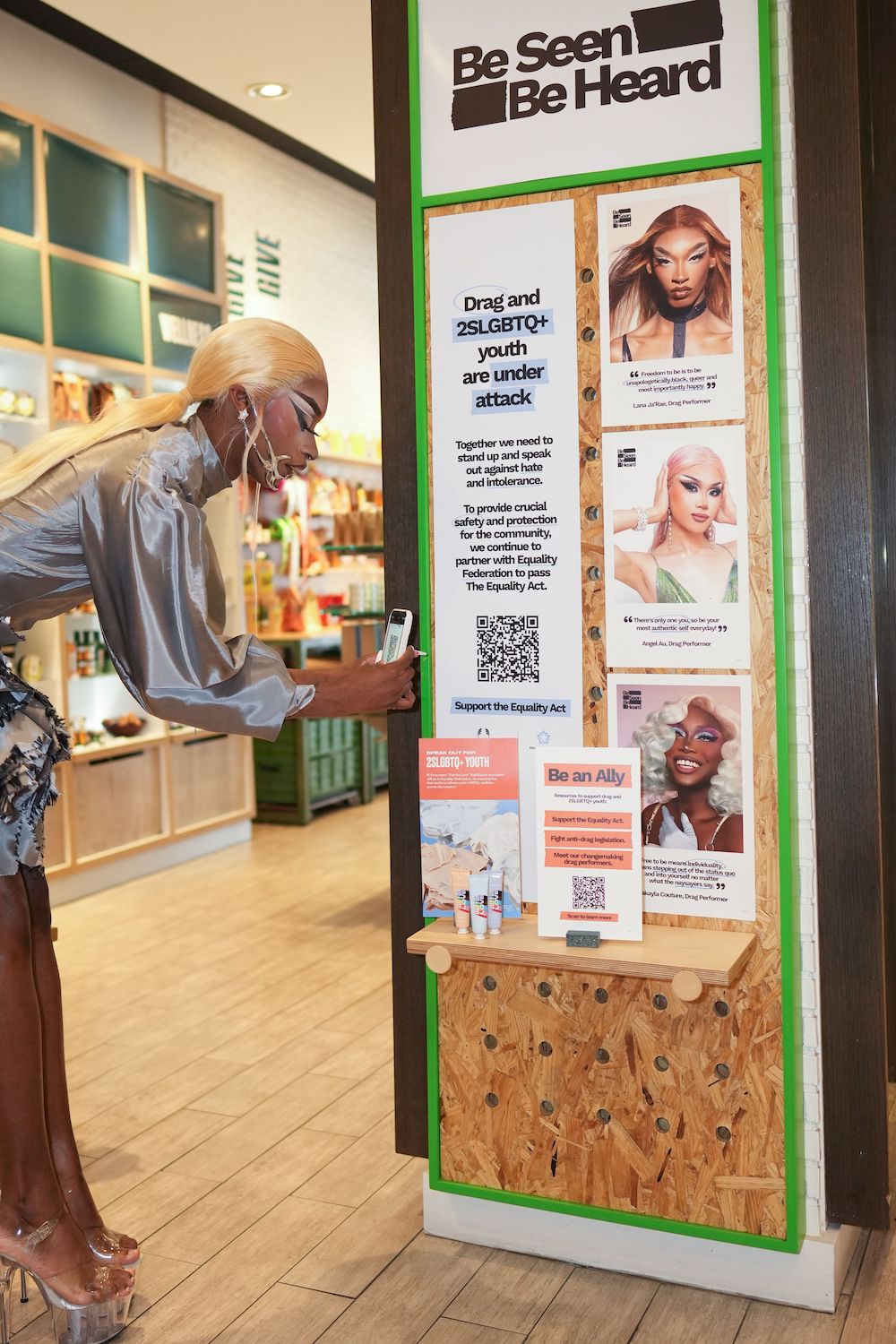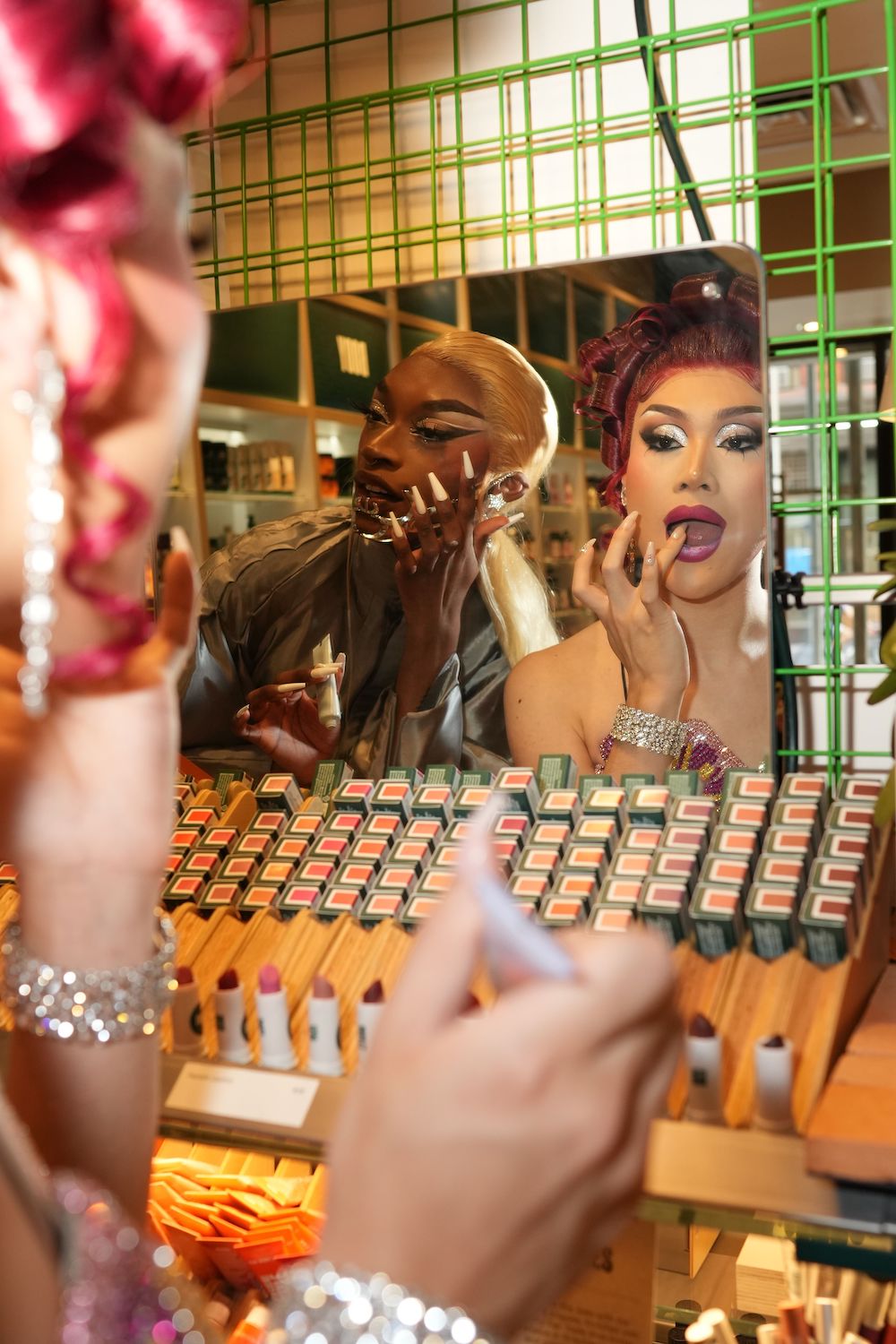
Drag performer Makayla Couture at The Body Shop.
This year's Pride Month comes as 491 pieces of anti-LGBTQ+ legislation make their way through statehouses across the U.S. and hostile rhetoric around drag performers and transgender people creates an environment that puts the community at risk.
The Body Shop, long known as an activist brand for its support of social and environmental causes, is one company that's stepping up to counter this trend and offer actionable ways for people to push for change. Its 2023 Pride Month campaign, Free to Be, celebrates drag performers and calls on customers to get involved in supporting the U.S. Equality Act — which, if passed by Congress, would extend anti-discrimination protections for the LGBTQ+ community across employment, housing, credit and more.
"The ambition is to support the drag community and the 2SLGBTQ+ community in their support of legislation, which we feel is the straightest line toward protecting them," said Hilary Lloyd, vice president of marketing and corporate responsibility for The Body Shop North America.
The Body Shop uses the designation "2SLGBTQ+" to recognize Indigenous people who identify as "two-spirit," which means they possess both feminine and masculine spiritual traits and are sometimes referred to as belonging to a "third gender." The company's inclusive support of this community extends from its retail stores and digital presence to engaging NGO partners, employees and customers to support legislative change.
Bringing Pride Month activism to life, in stores and online
The Body Shop's Pride Month campaign kicked off at North American retail stores on June 5, with local events featuring drag performers like Angel Au, Lana Ja’Rae and Makayla Couture, as well as an awareness-building campaign in partnership with the Equality Federation, an LGBTQ+ advocacy group and longtime Body Shop partner.
Signage and point-of-purchase communications featuring Angel, Lana and Makayla direct customers to learn more about the Equality Act and LGBTQ+ inclusion, and dedicated "Act Stations" tell them how to get involved. "Act, or activism, Stations in The Body Shop stores are designed and intentional environments where we conduct our advocacy work," Lloyd said. "There, customers can get educated. They can learn how to be an ally."
The Body Shop's activism stations feature key pieces of information about a given cause — in this case, it's LGBTQ+ inclusion, but the brand has also leveraged these stations for other causes like getting young people registered to vote. For the Pride Month campaign, shoppers can scan a QR code at the station to learn more about the cause and how to engage — including writing a letter to their Congressional representatives in support of the Equality Act straight from their phones.

Online engagements further amplify the activism of drag performers like Angel, Lana and Makayla, tell the story of the brand's ongoing support of the Equality Act, and provide actionable steps consumers can take to push for change.
"We've created spaces across retail, social and our e-commerce environment where folks can become educated and find out how best they can support — and, for us, support looks like letter-writing and reaching out to Congress to tell them they should pass the Equality Act," Lloyd said.
Does this kind of campaigning really work?
Activists have leveraged tried and trusted tools like awareness-building, letter-writing and educational campaigning for decades. But particularly at a time when fringe voices make it seem like we're more divided than ever, do campaigns like this really work?
For Lloyd, the answer is yes. "We have good examples of this type of work working in Canada," she said. "We campaigned very similarly for the All Blood Is Equal Campaign in Canada to do away with discriminatory blood bans, particularly for the 2SLGBTQ+ community." Following campaigns from activists and companies like The Body Shop, Canada ended its policy of banning blood donations from sexually-active members of the community in 2022.
This is The Body Shop's third year advocating for the Equality Act. Over the past two weeks, more than 660 people have used the brand's tools to write letters to their representatives, with engagement building fast. "We're feeling quite motivated by what we're seeing so far in the early stages of the campaign," Lloyd said.

How can more brands get involved? Five action steps for activism
So, given the rising backlash against brands engaging with Pride Month, are Lloyd and her team nervous about all this? "Certainly, it was something we discussed," she said. "We consulted our people — our field teams, in particular, because we thought it was really important to understand how they felt about any potential backlash or risk that might exist. The overwhelming conclusion was that we need to move forward."
But rather than boycotts, The Body Shop's authentic approach created something else altogether. "The response and reaction to our work in this space has been mostly positive, and I think it's because we're expected to be here and we should be here," Lloyd said. "It's the right thing to do, particularly because of our position on social progress."
But yours doesn't have to be an activist business to get involved, and Lloyd shared her top tips for how organizations of all kinds can push change forward.
Partner up. "Get the right partners on board, get yourselves educated, and ensure that you are listening to folks who can really support you through this type of advocacy work," Lloyd recommends.
Check your own house. "Look inward at your own business and make sure the advocacy that you're planning is reflected inside your business equally to what it is you have planned to do outside of your business," Lloyd said. For The Body Shop, this means ongoing and reciprocal relationships between the company and its LGBTQ+ employees.
"We have a group called TBS Together, and it's an internal network of 2SLGBTQ+ employees who help The Body Shop to be inclusive through their collective feedback," Lloyd said. "We introduced, for example, a transitioning at work policy in 2021, which is specifically designed to support transitioning employees to ensure they're treated with dignity and respect." The company also leveraged employee feedback to create a Work in Pride charter to formalize its support of inclusion in the workplace.
Start a conversation. "Talk to your people," Lloyd said simply. "If this is an area that's of passion, that is important for your people, listen to them, take their advice and make sure they feel supported."
Get involved in your own way. "There are a lot of ways to do this type of work. And at this point in U.S. discourse, authentic advocacy of any type is welcome — whether it's uplifting others who occupy this space, supporting organizations who protect others in this space, or actually planting a flag, so to speak, and putting your corporate voice behind it," Lloyd said. "All meaningful work here is good work at the moment."
Keep it going. Far too many campaigns pop up and fizzle out after Pride Month, Black History Month, International Women's Day or other observances come to a close. But to create meaningful change on these issues your teams and customers care about, you have to keep it going. "Until we see meaningful change, we will continue to advocate in this space," Lloyd said. "As we continually see damaging and harmful legislation introduced, again we will use our platforms as an opportunity, and we'll platform others and allow them to remind the public at large of the importance of the Equality Act. We do that on a continual basis, and we always will — until we see meaningful change."
Images courtesy of The Body Shop

Mary has reported on sustainability and social impact for over a decade and now serves as executive editor of TriplePundit. She is also the general manager of TriplePundit's Brand Studio, which has worked with dozens of organizations on sustainability storytelling, and VP of content for TriplePundit's parent company 3BL.














